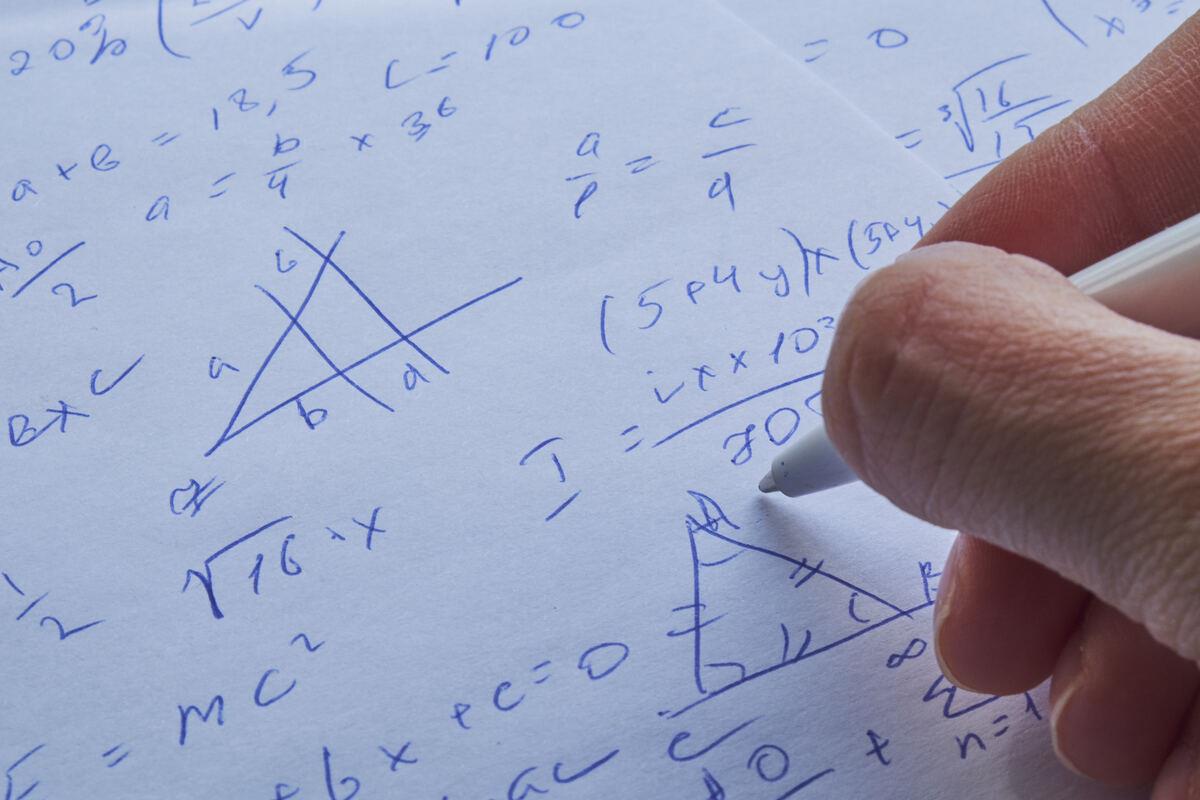Edexcel Maths past papers: the key to passing your Edexcel GCSE maths exams
For some students, GCSE Maths is one of their favourite subjects, while others would rather study almost anything else! Regardless of how you feel about it, Maths plays an essential role in building a strong foundation for many future career paths.
If you’re studying for your exams, Edexcel Maths past papers are among the most effective GCSE Maths revision resources available. Becoming familiar with the exam papers - and understanding how mark schemes work - allows you to structure your answers in the ways that examiners expect to see.
In this guide, we’ll explore everything you need to know about Edexcel GCSE Maths: from exam structure and grade boundaries to study tips, practice papers, and how a private tutor can help you achieve your full potential.
Content Table
Key takeaways
-
Practising with Edexcel GCSE Maths past papers helps you understand the exam paper format and improve your technique.
-
Each exam board has slightly different specifications and grade ranges; Edexcel GCSE is known for its reasoning-based questions.
-
Edexcel GCSE Maths exams often test multiple concepts in one question, so understanding how topics connect is crucial.
-
Knowing how the mark schemes work can help you earn method marks — even if your final answer is incorrect.
-
Coaching with a private Maths tutor can help you create personalised study plans and overcome common challenges.
Is Edexcel GCSE maths harder than other exam boards?
Edexcel GCSE Maths has a reputation for being slightly more challenging than some other exam boards. This is because many questions combine more than one mathematical concept, testing your reasoning and ability to apply knowledge to unfamiliar problems.
However, with the right preparation - including consistent practice using Edexcel Maths past papers and practice papers - you can build confidence and perform well under real exam conditions.
Understanding the Edexcel GCSE maths exam structure
The Edexcel GCSE Maths exam tests your understanding, fluency, and ability to apply mathematical concepts in real-world contexts.
You’ll be tested across the following key areas:
-
Number
-
Algebra
-
Ratio, proportion and rates of change
-
Geometry and measures
-
Probability
-
Statistics
Exam format
-
Two tiers: Foundation (grades 1–5) and Higher (grades 4–9).
-
Three papers in total: Paper 1 (non-calculator), Paper 2 and Paper 3 (both calculator).
-
Each paper is worth 80 marks, for a total of 240 marks.
-
Each paper lasts 90 minutes in total.
-
You can select the tier that best fits your target grade range.
When reviewing past papers from Edexcel, make sure they match the current specification rather than the old specification, as older versions may differ in format or content.
What are the grade boundaries for Edexcel GCSE maths?
Grade boundaries change slightly each year, depending on the overall performance of students. However, understanding the concepts tested in each Edexcel GCSE Maths paper can help you plan your revision in a strategic manner:
-
Paper 1: Non-calculator (tests mental arithmetic and written methods)
-
Paper 2: Calculator (tests reasoning and problem-solving with calculator support)
-
Paper 3: Calculator (extends analytical and application skills)
The Edexcel board’s exam design ensures that students are tested across multiple mathematical skills and contexts. Regardless of whether you are sitting the Foundation or Higher tier, regular practice with GCSE Maths past papers is essential for success.
What is the 'back question' in Edexcel GCSE maths?
A back question refers to the complex, multi-step problem found on the final page of Edexcel exam papers. These questions typically combine several topics - for example, algebra, geometry, and statistics - to test your ability to apply mathematical reasoning in unfamiliar ways.
You can find examples of back questions by reviewing past papers from previous years (e.g. November 2020) which are available on the Edexcel website.
Study tips - mastering mark schemes and past exam papers
Both past papers and mark schemes are essential tools for revision:
-
They familiarise you with the exam paper format, question types, and expected answer structures.
-
They help you identify your weak areas and improve your skills through repetition
-
Understanding the requirements set by the Edexcel mark scheme ensures that you gain method marks even if your final answer is incorrect.
-
Both resources improve time management, helping you to stay calm under exam conditions.
Important note! Always check that your Edexcel GCSE Maths past papers aren’t from the old specification! The current specification includes slightly different content and question formats.
A private online maths tutor can save you time by selecting the right Edexcel practice papers for your learning level.
Planners, routines, and expert help - steps to passing Edexcel GCSE maths
Creating a structured study plan is key to mastering Edexcel GCSE Maths. Here’s how to organise your revision effectively:
-
Understand the exam structure: Review Paper 1, Paper 2, and Paper 3 so you know exactly what’s expected.
-
Follow a consistent schedule: Use a planner to map out topics and track progress across each Edexcel paper.
-
Practise with timed exams: Work through GCSE Maths past papers under real conditions to improve pacing.
-
Focus on weaknesses: Review errors carefully using mark schemes and get feedback from a maths tutor.
-
Don’t skip the basics: Even simple questions can earn easy marks if done carefully.
-
Stay calm and confident: Manage your time wisely and always leave a few minutes to review answers.
Overcoming common GCSE maths exam challenges
Even if you can fly through maths revision questions without any issues, you may still find that you run into trouble on exam day itself. Let's take a look at how to make sitting papers a less stressful experience!
|
Area of challenge |
Goal |
Solution |
|
Time management during exams |
Complete all questions and review before the end. |
Practise timed papers and learn how long each section takes. |
|
Exam anxiety |
Stay focused and composed. |
Develop calming routines with your tutor; maintain healthy habits before exams. |
|
Non-calculator mental arithmetic |
Improve fluency and reduce calculator reliance. |
Practise mental maths daily and apply it to real-life tasks. |
|
Showing your working |
Gain method marks by following examiner expectations. |
Review Edexcel Maths mark schemes with your tutor and learn to present answers step-by-step. |
The biggest problem? When it comes to GCSE exam prep, one of the most frequent mistakes that students make is going it alone.
Why hire a private maths tutor for your Edexcel GCSE Exam revision?
All students - whether confident or anxious about maths - can benefit from private classes maths classes.
A personal maths tutor can help you:
-
Personalise your learning with tailored Edexcel Maths past papers and resources that match your specification and target range.
-
Receive one-to-one support focused on your progress and exam strategy.
-
Structure your revision effectively, ensuring you balance time between Paper 1, Paper 2, and other areas.
-
Improve confidence and consistency, especially when working through tough questions or timed practice papers.
-
Review mark schemes together: your tutor acts as a translator, helping you to understand what examiners reward and how to maximise marks.
How to find the right GCSE maths tutor for you
When hiring a tutor, make sure to select someone who:
-
Has proven experience teaching Edexcel GCSE Maths.
-
Understands the current specification
-
Uses Edexcel practice papers and past papers as part of their teaching strategy.
-
Offers flexible lessons tailored to your preferred learning style.
-
Can guide you through Paper 1, Paper 2, and the Higher tier if you’re aiming for top grades.
-
You get on well with! Post a FindTutors student ad to easily match with the perfect tutor.
Whether you’re following the Foundation or Higher tier, the right tutor will help you stay focused, manage your time, and feel ready for your Edexcel GCSE Maths exams!
Past papers for future success
Success in Edexcel GCSE Maths isn’t about luck - it’s about preparation. By following a structured study plan, practising regularly with past papers, and understanding how mark schemes work, you’ll be well on your way to achieving your target grade.

FAQs about Edexcel Maths past papers and GCSE Maths Revision
How many Edexcel GCSE Maths papers are there?
There are three Edexcel GCSE Maths papers in total:
-
Paper 1: Non-calculator
-
Paper 2: Calculator
-
Paper 3: Calculator
Each paper is worth 80 marks, lasts 90 minutes, and contributes equally to your final grade.
Are Edexcel GCSE Maths past papers free to download?
Yes! Edexcel releases GCSE Maths past papers for free on its official website, including question papers, mark schemes and examiner reports.
How often should I practise Edexcel Maths past papers?
Most students benefit from using:
-
1–2 past papers per week early in the revision period
-
3–4 past papers per week in the final month
-
Full exam-condition practice in the final two weeks
What’s the difference between Foundation and Higher tier in Edexcel GCSE Maths?
-
Foundation tier: Grades 1–5
-
Higher tier: Grades 4–9
The Foundation tier focuses more on core skills, while the Higher tier incorporates more challenging multi-step reasoning questions. Practising with the correct tier’s past papers is crucial.
Should I revise using old-spec Edexcel Maths papers?
No - avoid relying on old-specification papers.
They contain topics, formats and mark allocations that no longer match the current GCSE Maths specification. Always check dates before downloading past papers.
How do I use mark schemes effectively?
Mark schemes show you:
-
What examiners expect
-
How method marks are awarded
-
How to structure your working
-
What key steps must be shown
Using mark schemes alongside past papers helps you understand why answers score marks - not just whether they are right or wrong.
What are method marks in Edexcel GCSE Maths?
Method marks are marks awarded for the correct process, even if the final answer is wrong.
Showing clear working-out can help you earn valuable marks on multi-step questions.
What is the best way to revise for the non-calculator Paper 1?
The most effective methods include:
-
Daily mental arithmetic practice
-
Learning efficient written methods
-
Practising Paper 1 past papers under timed conditions
-
Focusing on key skills like fractions, ratios and algebra manipulation
How do I improve my Maths exam timing?
Try the following:
-
Use timed past papers weekly
-
Learn how long 1 mark should take
-
Circle tough questions and return to them later
-
Leave time at the end to check your working
-
Work with a tutor to develop personalised timing strategies
Can a GCSE Maths tutor help me with past papers?
Absolutely! A tutor can:
-
Give you mark-scheme-specific feedback
-
Show you how to earn method marks
-
Select the right past papers for your level
-
Help you break down tough multi-concept questions
-
Improve speed, accuracy, and exam confidence
FindTutors offers experienced GCSE Maths tutors who specialise in Edexcel exam preparation.



